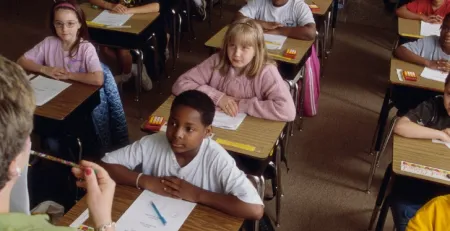The Sofa is Mocking Me and Other Tests of Resilience
“Summer,” for me, the word brings with it visions of long lazy days, sunshine, and splashing at the pool. Almost as soon as it starts, I also feel the existential dread that it will end too soon. This feeling is one many of my fellow educators share. Summer never seems to be quite long enough for all the things.
This year one of those things is organizing our basement. Since 2020 and the advent of the pandemic, our lower level has served many purposes. Our basement has acted as a classroom, multiple office spaces, and even an apartment. It has become a summer respite from the heat and an important gathering space for our family, and it has earned a really nice couch.
So, just a few nights ago, we endeavored to deliver that very thing. A new couch. On our first attempt down the curved stairway with our rather long sofa, we almost made it. Being that close to victory only spurred us on to try a new angle. When that didn’t work, we removed doors, cushions, and couch legs. Again and again, we attempted the impossible. Our couch became wedged in the gap, and we began to wonder if we’d have to take a chainsaw to it. Eventually, with just the right pressure and torque (pivot, if you will), we unstuck the thing and shoved it all the way back upstairs. And there it sits, a heap on its side, mocking me from the living room.
I am not unaccustomed to defeat. I have experienced failing and finding the strength to rise again. Most powerfully, this resilience has been modeled to me by the youth I have had the privilege of working with for over a decade. I am humbled by their stories and in awe of their strength. This strength has only become more salient with the challenges of the last few years. Educators and students alike have been functioning in crisis mode as rates of depression, anxiety, and suicidal ideation grow in our communities.
As we contemplate returning to school and these challenges, it can begin to feel like we are attempting the impossible. Nevertheless, as I reflect on the sofa dilemma, it has reminded me of three ways resilience can strengthen us.
Don’t give up. Sometimes we have very little control over circumstances, especially in the short term. A child’s home life or lack of community resources may be very real problems, but we might not be able to fix them immediately. In our willingness to walk alongside that child, we are often engaging in a relationship that can make the greatest difference. Don’t underestimate its power. Harvard’s Center on the Developing Child says these types of relationships “[…]provide the personalized responsiveness, scaffolding, and protection that buffer children from developmental disruption.”
Take a break. Sometimes humans need time and space to gain a new perspective. As Brene Brown says, “There is no innovation and creativity without failure.” Stop and breathe, sleep on it when you can, collaborate where possible, share the burden, and take time to care for yourself.
Find the good. Recognize the positive parts of the defeat. More than just focusing on what we learned from our “failure,” we can also practice gratitude for the experience. Perhaps you felt the strength of your community, or you connected with other humans in shared grief. These intentional recollections help us to cope during our most stressful moments. Robert A. Emmons, Ph.D, the world’s leading scientific expert on gratitude says that “its easy to feel grateful when life is good, but when disaster strikes, gratitude is worth the effort.”
Bearing this list in mind, maybe our sofa isn’t mocking me from the main level as much as it is motivating me. Whether we sell it, attempt a gentle deconstruction (YouTube beware) or go in through the basement window remains to be seen. What I can say, without a doubt, is that come this fall, it won’t be in the living room any longer. Making this commitment publicly, I am reminded that our shared experience of resilience can strengthen us to meet the challenges of increasing rates of anxiety and depression in youth and whatever else the new school year brings.
If you’re looking for tools to support your efforts in identifying youth with symptoms of anxiety or depression or need support for intervention and progress monitoring, check out MHS’ industry-standard, norm-referenced, comprehensive, multi-rater assessments for children and adolescents.
Learn more about the Children’s Depression Inventory 2™(CDI 2®) (ages 7-17)
Learn more about the Multidimensional Anxiety Scale for Children 2nd Edition™ (MASC 2™) (ages 8-19)










